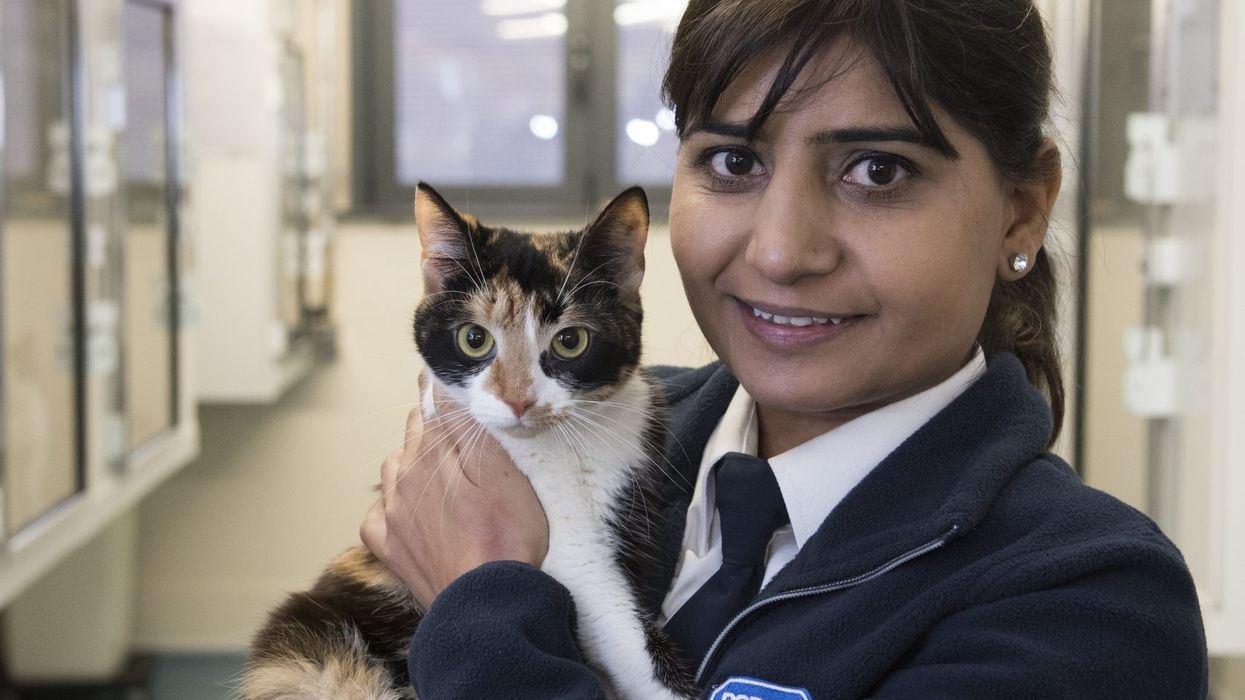THE PIONEERING RSPCA INSPECTOR DISCUSSES HER UNIQUE CAREER AND CHANNEL 5 SHOW
by PRIYA MULJI
FOUNDED in 1824, The Royal Society for the Prevention of Cruelty to Animals (RSPCA) is the oldest animal welfare organisation in the world and their first Asian female officer is Herchy Boal.
Having liked animals from a young age, she first found out about the RSPCA after watching TV show Animal Cops and after a long period of training started her history-making journey in 2000.
Since then, Herchy has worked hard in all areas of animal care and her admirable achievements include being part of Channel 5 show Dog Rescuers.
Eastern Eye caught up with Herchy Boal to talk about her unique journey in animal care, overcoming cultural barriers and work in lockdown.
What first connected you to animals?
From a young age, I can remember my dad being a huge nature and animal lover. He was a very influential figure in my early life and I vividly remember him being obsessed with documentaries and nature programmes. I also found them fascinating and felt an affinity with animals. While friends at school stamped on insects, I would feel that was inherently wrong and animal lives should be protected from pain.
What cultural barriers did you have to overcome in your work?
Working with animals wasn’t a traditional career path in the Asian community at that time. My mum didn’t realise that working with animals was a serious career path with room for progression. My family focused on traditional careers such as becoming a doctor or lawyer. I think she wanted me to do something else, so she could feel proud telling the wider community what I was doing. My dad was more supportive and knowing I had him behind me, allowed me to do what I really wanted.
What about now?
Now my mum is super proud and pleased with how things turned out. Particularly, when she sees me promoting my work on the TV. It is fair to say I’ve lived a less conventional life. I married in my late 30s and don’t have children through choice. I feel lucky that I did what I wanted and wasn’t held back by my gender or any expectations. I followed my heart. Sadly, I lost my dad last year, but I know he felt proud of me and the work I do.
What is it like working as the first female Asian inspector for the RSPCA?
I am very headstrong and never felt deterred. I just couldn’t believe there was no one else who wanted to follow this path. When I joined the RSPCA I was the first Asian inspector, but never felt deterred and it has made me tougher. I hope by talking about it, other young people reading this might realise that it’s a career path open to them. It’s an exciting and valid career. I feel like I am making history.
What has been your job’s most memorable aspect?
I was looking forward to receiving my long service award in 2020, which sadly had to be postponed due to the pandemic. A standout situation was a man who had owned chihuahuas and ended up with more than 80, as their breeding was out of control. We were really able to help turn his life around. He kept his original two dogs and we found loving homes for the others. It is lovely when you can help someone. The other side is finding justice for animals that have been deliberately harmed, to ensure their owner can no longer own animals.
Have any animal cruelty cases affected you emotionally?
It would be concerning if it didn’t affect you. It’s only human. Listening to people crying on the phone and having to watch footage of someone being deliberately cruel to an animal is very difficult. You love animals and want to save them – that is why you join the RSPCA, but you have to deal with awful things.
How do you stay mentally strong?
You have to think of the long-term goal and try to get justice. It is also key to have something else to focus on – I walk my dogs, go running, like to read and travel. I know that if I am abroad, I am more likely to allow myself a proper break.

What’s it like working on the Channel 5 show Dog Rescuers?
I’ve been working with them for many years, so feel very at ease with the work. There is pressure, but I am a genuine person and forget they are there. There are no retakes, it’s live filming – so sometimes I do say something silly! It’s not a normal TV programme where you can edit or cut it. You can’t fake it. I like doing it because it shows the public what we do day in day out. It’s a window into the world of an inspector.
You say the RSPCA inspectorate have carried on working hard throughout the lockdown and it is vitally important to do research when taking on the responsibility of an animal. What key advice would you give pet owners during lockdown?
Just remember that for them, although this is a great time as their owners are at home, when life goes back to normality that could hit them really hard. They are benefiting emotionally and getting more attention, but if you are returning to work, you need to phase that in so pets don’t feel anxious when you are gone. Try to keep stability and a routine for your animals.
How do you think have pets helped people during lockdown?
They have provided physical and emotional support for people – they have given us a purpose to get out and get walking. They are a calming influence and have provided comfort. You can always hug your dog. I have seen first-hand through helping owners how essential they are.
Tell us about your pets?
I have taken in so many animals over the years! I have hand reared countless kittens and even taken in budgies when the RSPCA had no space for them nearby. What’s lovely is that some wild birds I have released still come back and see me. Only two pets have stayed permanently; Loki, my cockapoo, who was dumped outside a vet’s in 2019 and was totally emaciated, and Murphy who is seven now – I bottle fed him and his litter mates, when he first came to me.
What advice would you give those wanting to work in animal welfare?
Volunteer! Look up local organisations around you like a wildlife centre or an animal home. Ask if you can help to clean or walk the dogs. Things are difficult with Covid at the moment, so see if anyone locally needs help? Perhaps, a lady struggling to walk her dogs or someone that needs help cleaning out their rabbits? I walked to the library as a youngster to read books about animals. People now have the internet, so use that to do research and gain a knowledge base.
What inspires you?
Wanting to make a change – helping people and animals. What inspires me most is seeing the difference I can make. I still get a buzz out of helping people and it can be something simple like giving advice to improve the welfare of an animal. It inspires me to carry on. People like David Attenborough hugely inspire me. I have been vegan for three years. I think we need to make a change on the planet – if we don’t, we will ruin it. In an ideal world, we would live in harmony with animals.
Why do you love working for RSPCA?
We are a unique organisation and a voice for all animals, when no one else can be. That attracted me to work at the RSPCA. We are diverse, also working for farm animals, animals in research and exotic animals – no other organisation does that. I know how dedicated people that work at the RSPCA are and how hard they work. Even when I’m not working, I am an RSPCA inspector and proud of that. It’s a lifestyle and vocation, not just a job. We effect change and make a difference. As an organisation, we challenge people to make a better world. Look at what we stand for and our mission – we live and breathe it.
To help the RSPCA continue rescuing, rehabilitating and rehoming animals in need of care, visit www.rspca.org.uk




